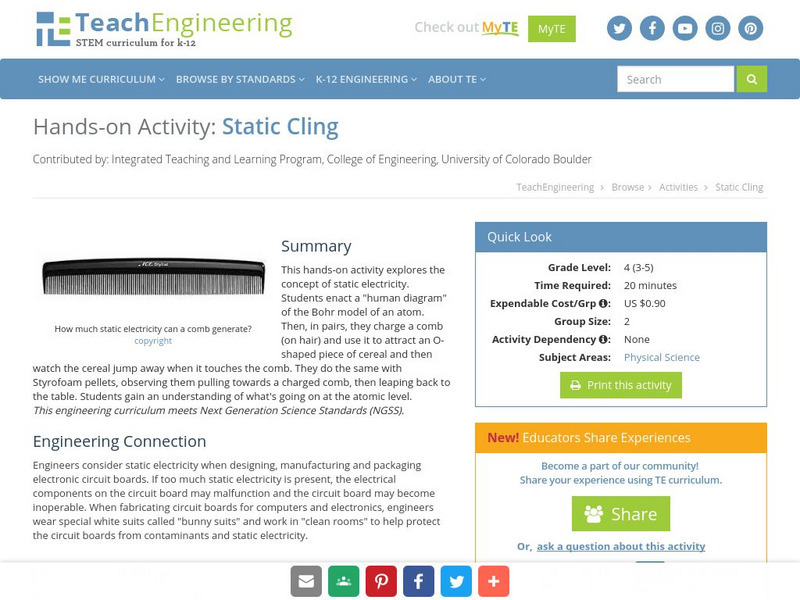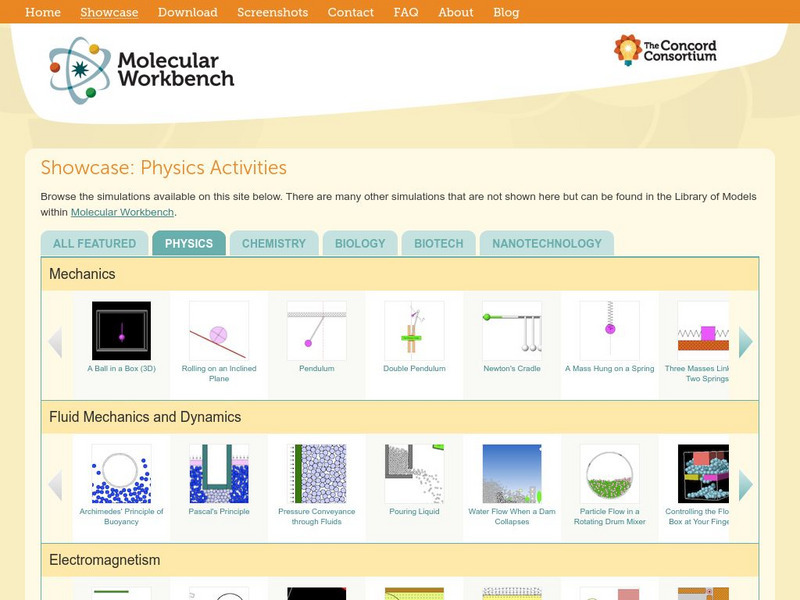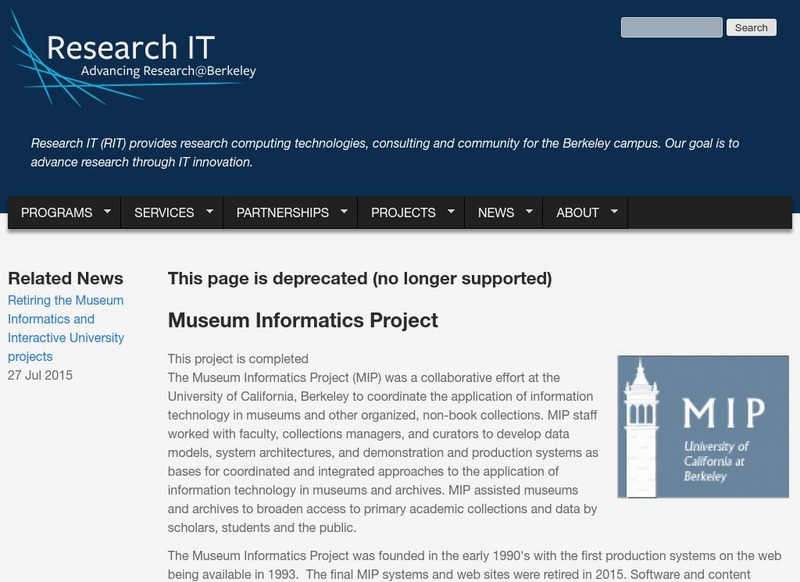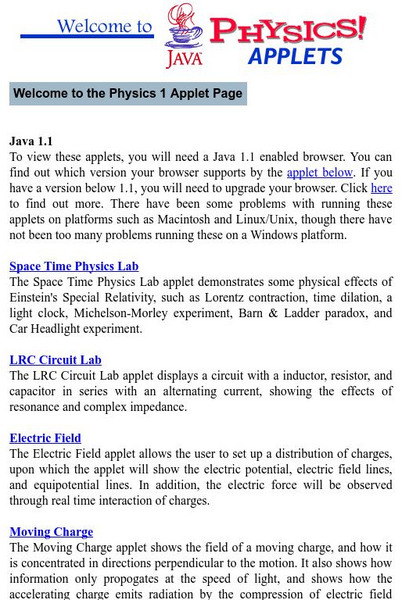Concord Consortium
The Concord Consortium: What Are Some Examples of Things That Stick Together and Things That Do Not?
In this learning module from The Concord Consortium, students will watch what happens when a Van de Graaff generator is used.
National High Magnetic Field Laboratory
Magnet Academy: Luigi Galvani
Luigi Galvani was a pioneer in the field of electrophysiology, the branch of science concerned with electrical phenomena in the body. His experiments with dissected frogs and electrical charges led him to suggest the existence of a...
Georgia Department of Education
Ga Virtual Learning: Electrostatics
Through informational text, interactive activities, practice problems, and virtual simulations, students learn about the basic properties of electricity in this unit.
Other
Science Playwiths: Electricity and Magnet Playwiths
A relatively easy set of instructions for building a Leyden jar, and an easy-to-understand explanation of how it works.
TeachEngineering
Teach Engineering: Static Cling
This hands-on activity explores the concept of static electricity. Students attract an O-shaped piece of cereal to a charged comb and watch the cereal jump away when it touches the comb. Students also observe Styrofoam pellets pulling...
Concord Consortium
Concord Consortium: Molecular Workbench Showcase: Physics, Electromagnetism
Students can use these simulations to understand concepts in electromagnetism. Simulations are available on the following concepts: Lorentz Force, The Hall Effect, capacitor, conductor, transistor, cyclotron, static electricity....
University of St. Andrews (UK)
University of St. Andrews: Charles Augustin De Coulomb
A large complete authoritative biography of Coulomb. Five large pictures, over a dozen links to contemporaries, references, a poster, other mathematicians. A fine source.
National High Magnetic Field Laboratory
Magnet Academy: Leyden Jar
These devices, though quite humble, represented a tremendous breakthrough in the history of electricity; they were the first capacitors, and as such were able to store electric charge. (Java tutorial)
CK-12 Foundation
Ck 12: Millikan Oil Drop Experiment
[Free Registration/Login may be required to access all resource tools.] Describes the Millikan oil drop experiment of 1909 that demonstrated how to measure an electric charge on one electron. Includes a video demonstration of the...
Georgia State University
Georgia State University: Hyper Physics: Point Charge Potential
This site from the Georgia State University explains the concept of electric potential about a point charge or combination of severat point charges. An interactive JavaScript form allows the visitor to investigate the effect of distance...
Science Struck
Science Struck: The Relationship Between Magnetism and Electricity
Provides a short explanation of the similarities between magnetism and electricity, the properties of their fields, and the effect they each have on a charged particle.
Concord Consortium
The Concord Consortium: Molecular Workbench: Needle Electroscope
Adjust the electrical change that is present in this needle electroscope simulation.
Science4Fun
Science4 Fun: Resistors, Capacitors, and Inductors
Electric circuits are used to provide a path to electric current. They commonly use three basic electrical components, which are resistors, capacitors, and insulators. They affect the electric current and changes the behavior of the...
Thomas Jefferson National Accelerator Facility
Jefferson Lab: Reading Comprehension Passages
Read and fill in the blanks of science passages which range from easy to very hard. Each blank has a dropdown menu with choices. When you finish, click CHECK MY ANSWERS. If you pick a wrong answer, the right answer will be displayed...
University of California
University of California Berkeley: Charging an Electroscope by Induction
From the U.C. Berkeley Physics Lecture Demonstrations website. A thorough description of an activity in which a charged metal plate is used to charge an electroscope by induction. Complete directions and a diagram of the equipment and...
Wikimedia
Wikipedia: Electrical Conductivity
This is the encyclopedic entry for electrical conductivity from Wikipedia.com. The site provides a brief introduction to the topic but provides numerous links to information relative to the topic.
Science Buddies
Science Buddies: The Strength of an Electromagnet
Has anyone ever told you that you have a magnetic personality? Have you ever heard that opposites attract? These common phrases are both based on the properties of magnets and magnetic electricity. In this science fair project, learn how...
California Institute of Technology
Magnet Lab: Caltech Physics Applets
Although specifically designed for physics students at Caltech, anyone interested in learning more about electricity, magnetism or various other physical phenomena can benefit by exploring these interactive applets. A circuit tutorial...
TeachEngineering
Teach Engineering: Lights Out!
This instructional activity introduces the concept of electricity by asking learners to imagine what their life would be like without electricity. Two main forms of electricity, static and current, are introduced. Students learn that...
Physics Aviary
Physics Aviary: Millikan Oil Drop Lab
This lab is designed to have students determine the charge on a series of oil drops that are suspended in an electric field. Students will measure the size of the drop in an effort to determine the force gravity on the drop. They will...
Other
Science Hobbyist: Sticky Electrostatics
A series of activities focusing on charge interactions, charging methods, and the conservation of charge. Activities utilize scotch tape and other readily available items. Includes explanations of what is happening.
MadSci Network
Msn: Why Do Some People Have Problems With Static ?
From the The Mad Scientist Network website, this page uses a question and answer format to discuss the concept of electrostatic induction. The cause of the common occurrence of an electric shock is explained.
Concord Consortium
Concord Consortium: Stem Resources: How Electrons Move
A collection of interactive activities and games to explore how electric fields and magnetic fields move electrons and charged particles in directions that can be planned. Understand that knowing how to control the movement of electrons...
CK-12 Foundation
Ck 12: Electrostatic Fields
[Free Registration/Login may be required to access all resource tools.] Electrostatic fields are explained and how to solve problems with them. Includes a simulation for exploring how charges work in an electric field.
Other popular searches
- Electric Charge Behavior
- Electric Charge and Force
- Physics Electric Charges
- Electric Charges and Current
- Flow Electric Charges





















